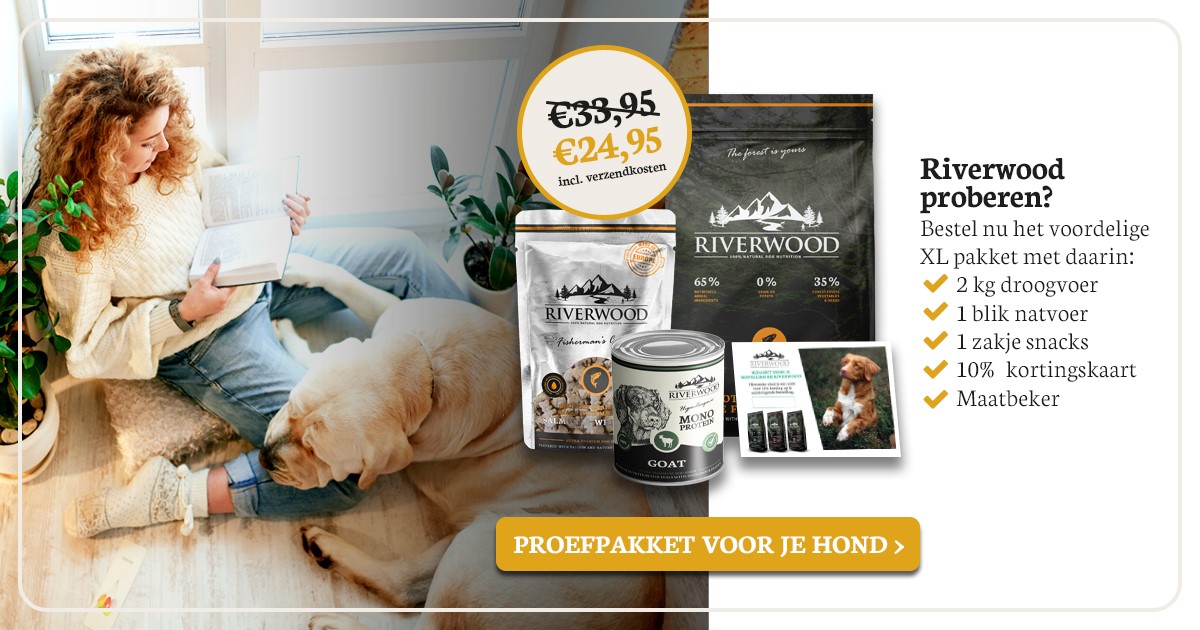Puppy or Junior Large Breed food?
You're standing in front of the puppy food shelf trying to choose an appropriate food for your little four-legged friend. Grain-free or grain-poor? A 100% natural food, yes or no? A food with only one protein source or one with multiple protein sources? The choice in dog food is vast... When you have finally made your choice in a brand, you are faced with the next question: is it best to feed your puppy puppy food or junior large breed food?

It's helpful to know that the choice in puppy food or junior large breed food has nothing to do with the age of your puppy. Then what does it have to do with, you may be thinking now. With the adult weight of your puppy:
Puppies with an adult weight of 1 - 25 kg receive puppy food;
puppies with an adult weight of 30 kg or heavier receive junior large breed food.
Note: Up to an age of 3 months, each puppy receives puppy food. After three months, puppies of large dog breeds may switch to junior large breed food.
What is the difference between puppy food or junior large breed food?
Of course, it depends on the brand what the exact differences are between the two varieties. With one brand, you may find more differences between puppy food and junior large breed food than with another brand. In general, however, there are four differences to be identified between puppy and junior large breed foods:
1. Fats
Generally, puppies of large dog breeds have a growth spurt between 8 to 14 months of age, but even before this time, animals experience considerable growth. It is important that large breed puppies do not grow too fast during this period, as this can result in enostosis (growing pains). To prevent large breed puppies from growing too fast, it is important to feed them a diet that contains balanced amounts of protein and fat. And that is the first difference between puppy and junior large breed foods: energy value/metabolizable energy.
Puppies get the energy they need to grow from food. When large breed puppies get too much energy through the diet, such as when they are fed regular puppy food or too much food, they can grow too fast. Therefore, for large breed puppies, it is best to choose junior large breed foods, which contain balanced amounts of protein and fats to support even and optimal growth, reducing the risk of enostosis.
2. Calcium
Another difference between puppy food and junior large breed food is the amount of calcium. The nutritional need for calcium is different in large breed puppies than in puppies of somewhat smaller breeds.
Large breed puppies are more susceptible to skeletal problems; the bones of this group of animals grow extremely fast, leaving more room for "mistakes. The bodies of puppies are not yet able to excrete excess calcium. When a large breed puppy gets too much calcium, it negatively affects skeletal formation and growth. When animals ingest excess calcium, it can result in deformed bones.
Therefore, it is very important that the diet contain a balanced amount of calcium. Often, the percentage of calcium (based on 100 grams of dry matter) is lower in junior large breed foods than in puppy foods; therefore, the diet contributes to optimal skeletal development.*
3. Glucosamine and chondroitin.
The joints of large dog breeds have a higher load than the joints of small dog breeds; the joints of large dogs simply have to bear more weight. To support the joints of large dog breeds, (extra*) glucosamine and chondroitin are added to junior large breed food. Glucosamine contributes to the formation and repair of cartilage. Chondroitin contributes to the elasticity of cartilage and a delayed breakdown of it. It is important that the diet contains both glucosamine and chondroitin; the nutrients reinforce each other's effects.
*Some brands also add glucosamine and chondroitin to the regular puppy food to support the joints. Often you then see that the amount of glucosamine and chondroitin is lower in the puppy food than in the junior large breed food.
4. Size of the kibble
A final, probably very obvious, difference is the size of the kibble. Chunks for small breed puppies tend to be smaller than chunks for large breed puppies. This promotes chewing on the kibble and contributes to a puppy being less likely to gulp or swallow the kibble in one sitting.
*To make a really good calculation of the amount of calcium in junior large breed food, you can calculate the number of grams of calcium per 1,000 kilocalories. This should be above 2.5 grams for large breed puppies, and below 4.5 grams (per 1,000 kcal).
If you want more information about Riverwood's puppy food, take a look at the product pages. If you have or will have a puppy with an adult weight of 1 - 25 kg, take a look at Riverwood Puppy Nutrition. If you have or will have a puppy with an adult weight of 30 kg or more, take a look at Riverwood Junior Large Breed.
Lots of dogs are already enjoying Riverwood every day. Would you also like your dog to feast on our delicious foods and are you curious which variety would suit your dog best? Then answer a few questions here and order an inexpensive sample pack right away.




